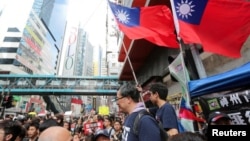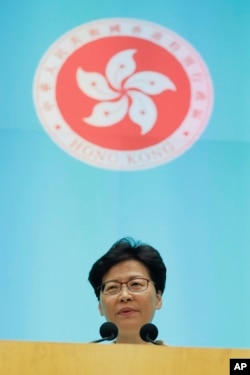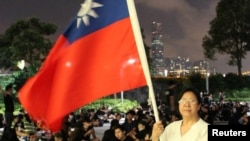A growing number of Hong Kong residents have left the territory in recent years and fled to Taiwan in search of democracy.
The number of people from Hong Kong approved for residency in Taiwan more than doubled over the past 10 years, official information shows. A major increase happened in the two years following Hong Kong’s 2014 Umbrella Movement protests.
Some experts think the most recent massive protests in Hong Kong over a proposed extradition law could lead even more people to flee to Taiwan. The legislation would permit criminal suspects to be sent to mainland China for trial.
Yung Xiu Kwan is a 67-year-old resident of Hong Kong. She told Reuters news agency the extradition proposal was the final issue that made her decide to leave Hong Kong.
Yung spoke to Reuters while taking part in a demonstration Sunday in Hong Kong that opposed the legislative measure. Tens of thousands of people joined the demonstration. Last week, Hong Kong police fired tear gas and rubber bullets at protesters during another demonstration outside government headquarters.
“Without freedom and democracy, it’s like being in jail,” Yung said. “Without freedom, (I) would rather die,” she added, while waving a Taiwan flag during the protest.
Yung said Taiwan offers a system to protect freedoms that Hong Kong does not. “Taiwan can offer that because Taiwan has democratic elections and a constitution that safeguards democracy.”
Hong Kong has been governed under a “one country, two systems” rule since its return from British to Chinese rule in 1997. Under this rule, Hong Kong was guaranteed the right to its own social, legal and political systems. However, some observers say China’s ruling Communist Party has ignored that agreement by forcing passage of unpopular laws.
China considers self-ruled Taiwan a breakaway province that is part of Chinese territory. Chinese officials have not ruled out the possibility of using force to take over the island in the future.
Taiwan has voiced strong support for Hong Kong keeping its political system separate from China. Many Taiwanese have also rejected China’s calls for an eventual “reunification” of China and Taiwan.
Chan is a 30-year-old former Hong Kong resident who spoke to Reuters. He did not want to give his full name. He said he moved to Taiwan in 2016 and is currently planning to help his parents retire there.
Chan says his decision came after he saw several Chinese attempts to limit civil liberties for people in Hong Kong. “It’s like there’s a burglar in my house and I’m the one who’s forced to leave because I couldn’t defeat him,” he said.
Hong Kong resident Melvin Chu told Reuters he plans on moving to Taiwan with his wife next year because of worries over political freedoms. “Things are getting worse in Hong Kong. We are worried for the next generation,” he said.
Hong Kong’s leader, Carrie Lam, offered another apology on Tuesday for the political crisis and unrest created by the proposed extradition law. Lam told reporters work on the bill was over until it expires in July next year. "I have heard you loud and clear and have reflected deeply on all that has transpired,” she said.
She added she realized that she had to “personally” take responsibility for events surrounding the bill. However, Lam rejected the protesters’ demands that she resign over the issue.
I’m Bryan Lynn.
Bryan Lynn wrote this story for VOA Learning English, based on reports from Reuters, the Associated Press and Agence France-Presse and VOA News. Hai Do was the editor.
We want to hear from you. Write to us in the Comments section, and visit our Facebook page.
______________________________________________________________
Words in This Story
resident – n. someone who lives in a particular place
extradition – n. the sending of someone back to the country where they are accused of a crime
burglar – n. someone who breaks into buildings illegally to steal things
reflect – v. to think about in a serious and careful way
transpire – v. to happen







